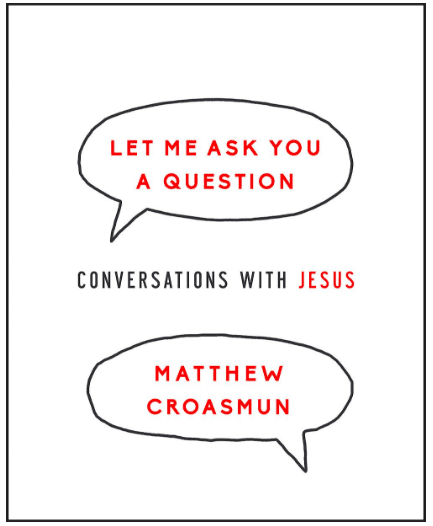 Jesus asked his audiences many questions.
Jesus asked his audiences many questions.
What if we stop with Jesus’ questions and let them interrogate us? What if we ponder and pray over Jesus’ questions?
Which is exactly what Matthew Croasmun does in his church-friendly and small-group-friendly book, Let Me Ask You A Question: Conversations With Jesus.
Organized into five weekday exercises around the one big questions, Croasmun asks these questions:
Week 1: What Do You Want Me to Do for You?
Week 2: Has No One Condemned You?
Week 3: Why Do You Worry?
Week 4: Does This Offend You?
Week 5: Who Do You Say I Am?
Week 6: Who Are You Looking For?
Designed for Lent but this book fits into any church’s calendar and it also fits into any Bible study’s group schedule.
So, Jesus asks us questions. What if we hear his question and answer him? What if have a conversation with Jesus based on his question addressed to us?
Our goal in this experiment of responding to Jesus’ questions is to engage relationally. The goal is not to seek the “right” answers. In many cases, this will be obvious enough; there won’t be one “right” answer. In other cases, we may be tempted to think that a “right” answer exists (indeed, in some cases, the context of a passage itself provides such an answer). But even if and when the passage itself supplies a “right” answer, answering honestly better serves to build the relationship we’re after—even if that honest answer is the “wrong” one. Time and again in the Gospels, “right” answers serve people poorly, and “wrong” answers lead to profound encounters with Jesus. Engaging honestly with Jesus always moves people toward a closer relationship with him. My hunch is that the same will be true of our encounter with Jesus through the questions he asks us in these pages. …
Finally, as we listen for the voice of Jesus in these questions and the conversations that come from them, the presence of others can be vital in helping us discern what we hear. Learning to hear the voice of God is no easy thing, and we need support along the way. The people of God have always had processes for discerning in community. This communal discernment is at the core of how Paul, the ancient church planter, describes the church. As a discerning community, the church has access to the mind of Christ, and members can work together to weigh the significance of what they hear Jesus saying to them. So as we engage in this experiment, let’s invite others to join us and help us process what we hear and what we might do as a result. Let’s now turn our attention to the questions Jesus asks.










